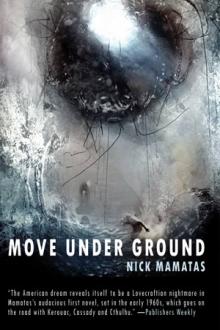Move Under Ground - Nick Mamatas (best romance books of all time .txt) 📗

- Author: Nick Mamatas
- Performer: 0809556731
Book online «Move Under Ground - Nick Mamatas (best romance books of all time .txt) 📗». Author Nick Mamatas
“They danced you know, the mayor did, and so did the sheriff and the pediatrician. Some kid drew that on the chalkboard too, the three of them dancing while baby stick figures cried and screamed.” He looked up at me, his eyes large and star-crazed again. “The sheriff had on a cowboy hat and wore a crooked star over half his stick-line body, and they drew the doctor with a big old mirror on the top of his head, like in the movies. And they were smiling, those three characters, big crescent smiles that punched through the sides of their circle faces. But you know, it wasn’t because of the pain. Cthulhu, He knows nothing of pain, or human suffering. Not any more than we know of bacterial suffering. Do they scream when we go to a doctor and take a pill? Oh, his servants danced all right, not because they loved the pain or were celebrating death, but just because not one of those poor men had ever heard so many kids scream for so long before.”
Neal stood up and dusted off his knees, and then sneezed. Without a word he got into the backseat of the car and pulled our rucksacks back with him so I’d have to sit in the front with Bill, shotgun.
“Where are we headed?” I asked Bill.
Bill didn’t even look at me as he shifted and stepped on the gas. “New York. We have to save the world. Only Beats and grifters and bums and junkys are immune to the Call.” New York, oh how I missed her, but couldn’t bear to even dream what might be happening in her valley streets. I closed my eyes and tried to extinguish the self, so that I could act without thought, but Neal shattered my arrogant meditation.
“They danced, not because they were taken over by dime-novel demons who love to listen to people suffer,” he said, finally able to talk again. “They danced because the tiny bit of their brains that remained human wanted everyone to be happy and everything to be normal. And that little human bit of the brain just told their bodies that the kids were singing and would be happy if they danced, so they did.”
Once, in Northport, I found myself down by the water, walking through the flat old park. I’d like to sit on a bench, shake a hand or two, and maybe wait for someone to invite me in for a drink or for a night of bracing conversation. There were some cool artists in Northport—it was close enough to Manhattan, but the houses were large and cheap, good space for studios, so painters were drawn to the little burg. Me, I was drawn to the water (this was long before I knew what horrors waited for us all in the depths of the salty seas) and to the men who worked it for their daily bread. One guy, a round little man, the kind of joe you’d say was built like a fireplug if you thought fireplugs were a lot thicker around than they really are, was an ace with a net and a rowboat. George never failed to drag in a net full of porgies or blues, even when the other fishermen would just stare at their feet and swing empty buckets as they walked through the park and up the hill to their little homes. And George’s fish were peaceful; they’d try to breathe the poison air, huffing and staring from within the lattice of his old net, but they never flopped or twitched. They were coming home, they knew.
George would clean his fish right on the shore, scaling them but never hacking off the heads or tails, while flies circled him and his catch like black snow. There’s more than one unsold painting of him tucked into racks in Northport attics. The artists would wait, along with the flies, for the first traces of a red-streaked sunset, because they knew that that was when George would be coming home.
Mostly I just watched George scale, gut and sometimes fillet his fish right on the spot. He was a swordmaster with his sharp knife, black with age with a worn wooden handle. He could scale a fish in two strokes, gut it in one, and then take just an extra second to cut it into filets or steaks. Nobody could touch him for speed or grace, neither machine nor dancer could do George one better. The painters never even bothered trying to capture his real speed on canvas, instead they just went abstract on him—George’s head floating above a swirl of red rain, a great white streak cutting through the sky, or just the park at dusk, George-shaped hole where he had been standing, and nothing but flies and fishguts littering the damp grass at the bottom of the canvas.
With the first fish, George would always cut out the sweetest meat and throw it away. “Leave something for the flies,” he explained to me, or if I was sitting too far away, to nobody but the flies themselves. “Go on, eat your own,” he’d tell them as he pulled another thick bluefish from his net, but they just kept swarming and buzzing, smacking into his head or hands, or landing on his shoulders. I swallowed more than one big horsefly myself that summer.
“You like fish?” George would ask, and I would offer to pay him, but he’d just hand me fresh-gutted fish wrapped in newspaper and wink at me, because he knew I was watching him the way I’d listen to jazz, with a heart full of love and desire. He never seemed to remember that sure, I do like fish, especially the porgies grilled still in the skin. Memere would take off the heads and tails for us first.
Three days went by and there was no George. On the first day, the painters stayed till the sun sank into the sound waiting for him to come in, but he’d never been out that day. On the second day, fewer people came, and fewer flies too. On the third day, it was just me, waiting for George, drinking a beer out of a paper bag while on my little park bench a few yards from the pier, but I didn’t see him until I decided to head for home by way of the bar. He was inside, working a cat’s cradle with thin white wire.
“Look, Jack,” he told me. It was the first sentence I’d ever heard him say that didn’t talk about fish. “Look at this.” His voice was deep and dead. And George shook the wire from his fingers and into my outstretched palm. The wire was soft. Like nylon, it was nylon, a strand thinner and tougher than I’d ever seen.
“That,” George said, nodding to the mess of twists and knots in my hand, “is the future. I retire now. They’ll make nets from that stuff one day, nets five miles long, and they clean the sound from Montauk to Brooklyn.” I snorted, too dazed to comprehend him—I thought poor George was joking till he slammed a fist against a table. “No!” he shouted, and damn sure if his voice was the only one left in the bar, or even the town. “They will! The oceans will be lined with huge nets, they’ll drift on the currents and sweep up all life. The tuna, the shark, jellyfish, porpoises … WHALES!” Some dumb drunk tittered way in the back of the room, but George didn’t even have to turn around to shut him up. George inhaled sharply, and the heckler swallowed the rest of his giggling.
“Fishing, it’s not an art anymore,” he said. “It’s war. It’s the gas hissing into the showers at Auschwitz.”
It was war. It’s war now. There was a drift net, just like the one George told me about those years ago, ethereal and rising from the Pacific, dragging its way across America. Whole towns were falling into its haunted tangles, the souls of their resident fools the catch of the day. And me and Neal and now Bill, all piled into a Caddy Neal found parked in Goodland’s local Methodist Church, were trying desperately to outrace the tide. We’d be ahead in one town, then stop for the night under a cracking moon, and in dreams I could see the dark strands drift across the night, taking whatever little town we were holed up in with it. In the morning, mugwumps ruled and the air tasted of salt and scales.
We learned to drive at night, and to head only to the cities, where there were nooks and crannies to hide in, bars a human being could still get a drink at. We moved under ground, through sewers and into basement pads with those few people, usually dharma bums and older Beats, or wild women with ironed hair, who knew enough to resist or dodge Cthulhu’s inexorable reach.
Tramps and hoboes poured into the cities behind us, trembling with stories of life on the road and rails. Great beasts twenty feet long were strapped down to flatbeds and screaming their way across the country, the beetlemen drivers happy to rip off and consume their own ears just so they wouldn’t have to hear the wailing, wailing that could kill a man. Wheat fields burned under waves of green fire; it was cold and flowed like heavy ocean water, and left no smoke behind. “You don’t burn up in it,” one fellow told me, “you drown in it.” He’d seen his woman go down under a wave of the stuff, and then come up, green spurting from her nose and mouth; then she went down again. “I waited for her to come up again, you know, because you’re not a goner ‘til you go down three times in normal water, but with this stuff you don’t get no second chances.” Then he cried until Neal’s new girl for whatever that town we were in, Mandy or something, took him to a couch and fed him jelly-jar wine ‘til he was able to sleep.
Driving was insane. Neal never slept anymore, and always wanted the wheel. He drove is in a wild route—up to Omaha for a horrible afternoon tour of a city in flames, then he pulled a massive U-turn, smoking the back wheels nearly off the back of the car, and sent us hurtling back towards Springfield. Bill was mostly on the nod—though I could never catch him making the connection, he always found his horse, no matter what lonely highway we were traveling down—so I’d have to wrestle Neal for the wheel one-on-one. I was slower than he was, and he knew the tricks of prison infighting: the knee to the balls was just a feint, I’d jerk away and right into where his thumb was waiting for my throat—but I learned a few tricks from





Comments (0)